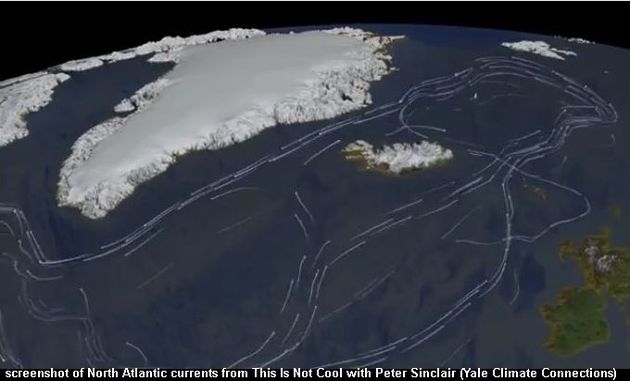
11 October 2017
The ocean is warming, the ice sheets are melting, and the sea is rising. Does global warming mean we’ll be warmer here in the northern hemisphere? Maybe not.
In this video by Yale Climate Connections, Jørgen Peder Steffensen, an expert in ice core analysis from the Niels Bohr Institute, explains how the Earth can become hotter yet simultaneously plunge Europe into an ice age and North America into ice or drought. It’s a matter of distribution.
Here are some points that stunned me in the video:
- In the last 1 million years there have been 10 ice ages, each lasting about 90,000 years.
- In-between ice ages are interglacial periods of milder, more stable climate that last about 10,000 years. We’re in an interglacial period right now. It’s already 11,000 years old.
- Ice ages are not uniformly cold. Far from it! Steffensen says, “Inside an ice age the climate is extremely unstable, and you have this sequence of abrupt climate changes [semi-cold to very cold] that happen basically from one year to the next.”
- Earth can have an ice age in one place and be hot elsewhere. Ice cores indicate that when Greenland has an ice age, Antarctica is warm — and vice versa.
- Earth’s current mild climate is due to a global distribution pattern of ocean currents and pressure systems that keep temperatures mild and rainfall moderate.
- The global distribution pattern can change abruptly. We don’t know where the trigger is, though we do know our emissions add fuel to the fire.
As Steffensen says, “The climate does not play nice all the time,”
Learn more at Yale Climate Connections: Humans experimenting with climate’s ‘playing nice’
(screenshot and video from This Is Not Cool with Peter Sinclair, Yale Climate Connections)
That politicians (or others in power) can squelch scientists from publishing their findings is frightening, but nothing new. Remember that Galileo was labeled a heretic! This highlights the need for individuals to take responsibility for their own beliefs, basing them on critical thinking and their own search for facts. Sadly, most Americans do not make the effort, nor do they understand how to think critically and draw conclusions based on those facts. The decline of America’s education system over the past several decades (consider how American students have been falling behind their counterparts in many other countries for decades) and the rise in people’s susceptibility to ‘fake-news’ highlight this lack of understanding. The fact that people think ‘global warming’ means the entire planet is warming underscores this misunderstanding. Scientists have been discussing climatic change for decades (calling it climate change is grammatically incorrect, and another example of decline in our educational system), and scientists have been saying that there will be differing effects across the planet (some places will heat up, others will cool off, storms will increase in intensity in some areas, droughts will increase in some areas, etc.,). Hopefully some people will realize that they need to take responsibility and be pro-active: control your own ‘carbon footprint’ if your politicians are afraid to mandate such controls, choose to purchase ‘green energy’ if you are able (and ask your electric company to offer this option if you currently don’t have the option), move away from the coast to protect yourself and your property from flooding, search for the facts and do your own research rather than accepting what non-scientists who have something to gain are telling you). Ah, the list goes on, but I must move on to my own scientific studying….Thank you Kate, for using your blog to highlight such great variety in topics about our environment!